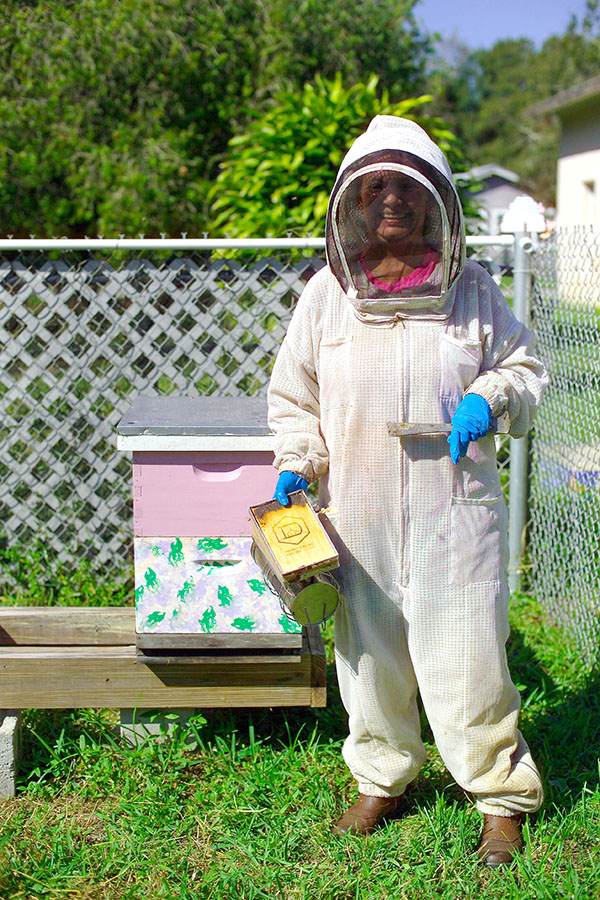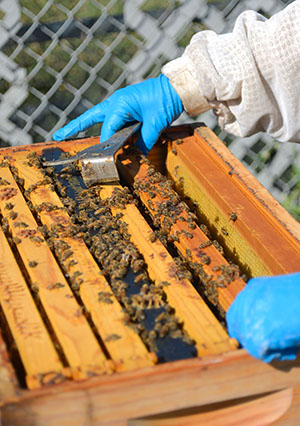The BEEKEEPER

BY KERRY FIRTH
Dana Fisher has a thirst for knowledge, so when she noticed that the fruit trees in her yard weren’t producing good fruit and she wasn’t able to grow vegetables, she did some research and found it was a lack of pollinators in general.
Her research revealed that honey bees were very efficient pollinators primarily because they have the big numbers and can pollinate a lot faster than the native bees and the nighttime pollinators like bats and moths. Always one to take action, she set about learning all she could about beekeeping and set up her own backyard apiary.
Her hobby turned into her passion and it wasn’t long before she joined Treasure Coast Beekeepers, a nonprofit organization that provides education about bees and beekeeping. Her goal was to learn more about beekeeping and to share her experiences with other bee hobbyists. She also enrolled in a master beekeeper program at the University of Florida.
Now, four years later, she is president of the organization that has between 60-100 members. Members meet on the third Wednesday of every month at 7 p.m. at the IFAS Hurricane House, 8350 Picos Road, in Fort Pierce to share information and knowledge about their hobby.
Taking it a step further, Fisher owns and operates Monarda Apiary, a beekeeping supply store geared to backyard beekeeping and hobbyists. She has an online store at www.monardaapiary.com and a small shop in her backyard.
“If you are a beekeeper or want to learn about beekeeping, I probably have something out there to help. I have things like hive boxes, beekeeper suits, smokers and stuff to process honey. I process honey and sell it as well.”
According to Fisher, honey bees are the most prevalent on the Treasure Coast and the darlings of most beekeepers. Native bees are more solitary and many are ground dwellers or so small that you can’t see them unless they actually light on a flower and you are looking at it. The native bees range in size from as tiny as a gnat to about the size of a bumble bee.
“Honey bees are the ambassadors for pollinators, just like the monarch butterfly is for butterflies,” Fisher said. “Because honey bees are a managed species, they are surviving quite well. I’m more concerned about native bees that only pollinate one special plant.
“If you grow a garden and you want squash, only specific bees will pollinate squash. If that bee doesn’t have enough habitat in your area, you won’t have very many squash. People need to remember the monoculture of rolling green lawns destroys and interrupts the habitat for all native pollinators. A lot of bees live underground so fertilizer that soaks into the ground kills them. All bees need a natural habitat and by stripping the native vegetation, we are threatening their existence. It seems like people have lost balance in working with nature.”
While Fisher enjoys working with her little buzzing pets, most people tend to panic if they find a swarm of bees nesting in their eaves or attics. A state registered beekeeper can do a live removal or if you just want them gone or have an allergy to them and you simply can’t live with them anymore, any pest control company can kill them.
“Generally, bees won’t sting for no reason,” Fisher clarified. “If you get stung by a bee you are either too close to the hive and they are defending it, or you stepped on them in the sand. While bee removal is not a service provided by Treasure Coast Beekeepers, some members will independently remove bees. We have a request page on our website at www.treasurecoastbeekeepers.com.”
Everyone loves the sweet taste of fresh Florida honey and the state is third in honey production in the United States. Local raw honey is known to be a powerful antioxidant and contains bee pollen and propolis, substances produced by bees that have been used medicinally by humans since ancient times.
The Farmer’s Almanac states that eating unfiltered, unheated, raw honey produced within a 50-mile radius or less is like receiving a natural anti-allergy shot. It stabilizes the cell membranes that release histamine, which triggers allergic reactions. It also contains bee pollen and bee propolis which boosts the immune system and builds immunity to allergens.
It also can be used topically on minor burns or scrapes as a natural antiseptic, as a cough suppressant, for sunburn relief and to mix with protein powder for a healthy sports drink to replace electrolytes.

DANA FISHER
Age: 46
Lives in: Fort Pierce
Family: Husband, grown son, pound puppy
Occupation: Owns and operates Monarda Apiary, a beekeeping supply store
Education: High school and college courses at Indian River State College
Hobbies: Crocheting, gardening, reading
What Inspires you?: “The drive for knowledge — the more I learn the more I want to learn.”
Something people don’t know about you: “I’m actually very shy.”
See original article in print publication
Nov. 15, 2022
